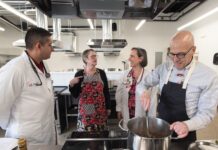
The University of Louisville has received $750,000 to launch the Robotics and Additive Manufacturing Pathways to SUCCESS (RAMPS) program aimed at preparing workers for the automated workplaces of the future that involve collaborative human-machine interfaces and 3D printing.
The skills needed by nearly all manufacturers soon will be shaped to some degree by the rapidly accelerating robotics and machine learning revolution, including automation, robotics, additive manufacturing and artificial intelligence. RAMPS will allow UofL’s Louisville Automation and Robotics Research Institute (LARRI) and other centers to purchase additional advanced equipment, such as a robotic quadruped, and introduce future workers to these devices.
“We want to make this technology accessible for people or students who don’t necessarily have the advanced technical skills, but they are enthusiastic,” said Dan Popa, director of LARRI and lead for the RAMPS project. “They want to learn about robotics, AI and additive manufacturing, how they are used in industry and what kind of skills you need to operate this type of equipment.”

Made possible by funding secured by U.S. Rep. John Yarmuth from the U.S. Department of Education, RAMPS aims to address workforce needs in the advanced manufacturing industry sector and enhance employment opportunities for underrepresented groups. It will allow LARRI, the Additive Manufacturing Institute of Science and Technology (AMIST) and Micro/Nano Technology Center (MNTC), all based in the J.B. Speed School of Engineering at UofL, to obtain additional equipment and pilot programs to increase awareness and access to training in robotic and additive manufacturing technology over the next year.
“I’m so proud to have secured $750,000 in federal funding for UofL’s RAMPS program, which will help students excel in the industries of tomorrow,” Yarmuth said. “Manufacturing is a key sector of our local and state economy, and robotics and automation will have a tremendous impact on how businesses and industries operate moving forward. UofL is a national leader in innovative training programs, and through its RAMPS program, students will have access to the state-of-the-art equipment and training that will best position them to succeed in our rapidly changing workforce.”
“The RAMPS program not only will help fulfill today’s workforce needs of our commonwealth, it also will enhance the University of Louisville’s work in advanced research and education in robotics and additive manufacturing,” said UofL Interim President Lori Stewart Gonzalez. “We are extremely grateful to Congressman Yarmuth for his support in helping us obtain this funding.”
Using existing and new equipment and leveraging the knowledge and skills present in the UofL facilities, RAMPS leaders will introduce K-12 students, high school graduates and university students to robotics and additive manufacturing and help train them to use these advanced technologies in the workplace.

“The goal of this program is to help future technicians and engineers prepare for employment in additive manufacturing fields that are both high-paying and growing in need. Whether it is a mid-career person looking to transition professions, a currently enrolled college student or someone with no post-high school education, we will be delivering workforce training tailored to an individual’s starting education and skills level,” said Thomas Berfield, co-director of AMIST.
Berfield anticipates that AMIST will add equipment used in the aerospace, automotive, dental and biomedical industries, among others.
Workers at Kentucky’s multiple manufacturing facilities are expected to be disproportionately affected by the shift toward automation, making programs like RAMPS essential to advance employment opportunities in the commonwealth.
“While it is true that automation is expected to displace workers in manufacturing, the adoption of robot technology actually predicts wage growth as those positions are replaced with higher skilled workers in high-tech positions needed to interface with the robots,” Popa said.
RAMPS leaders expect around 200 students will be exposed to these technologies in the first year as part of pilot projects, followed by more robust and formalized workforce training programs and curricula to be developed in future years.
In addition to training workers, RAMPS will elevate UofL’s programs at LARRI, AMIST and MNTC by further improving the high-quality learning environment within these centers, attracting highly qualified faculty and talented students and increasing opportunities for additional funding.
Since the opening of LARRI’s dedicated robotics lab on the UofL campus in October, it has hosted more than 400 K-12 and college students, industry professionals and researchers to learn about existing and potential uses of robots, drones and other technology.
“The research we do here at UofL has real impact in engineering a future technology-driven economy in Kentucky and beyond,” said Kevin Gardner, UofL’s executive vice president for research and innovation. “We are grateful to Congressman Yarmuth for securing this funding to expand that impact and support our work to build the next generation of robotics technologies and professionals.”































